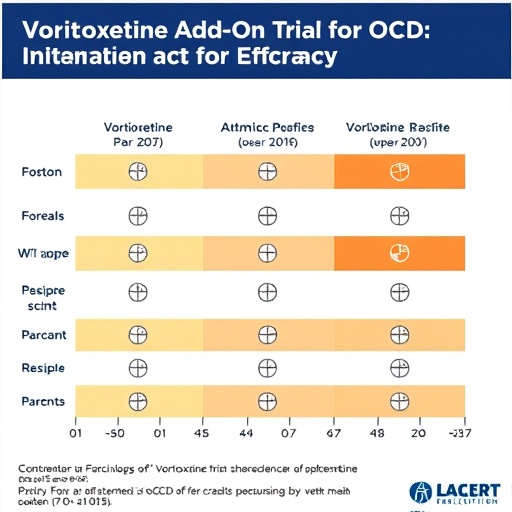In a groundbreaking clinical trial set to redefine the management of obsessive-compulsive disorder (OCD), researchers are exploring the potential of vortioxetine as an adjunct therapy. OCD is a complex neuropsychiatric condition that impacts approximately 2 to 3 percent of the global populace, often leading to profound functional impairments and markedly diminished quality of life. Despite its prevalence and severity, pharmacological treatments sanctioned by regulatory agencies such as the U.S. Food and Drug Administration (FDA) remain scarce, highlighting the urgent need for innovative therapeutic strategies.
Vortioxetine, originally approved by the FDA in December 2013 for major depressive disorder (MDD), boasts a multimodal mechanism of action that distinguishes it from conventional antidepressants. It modulates various neurotransmitter pathways, including serotonin reuptake inhibition and receptor activity modulation, which collectively contribute to its antidepressant and cognitive-enhancing effects. Preliminary studies have indicated vortioxetine’s potential not only in alleviating depressive symptoms but also in improving cognitive function, an area frequently impaired in OCD patients and often unaddressed by standard treatments.
This upcoming randomized, double-blind, placebo-controlled superiority trial is meticulously designed following CONSORT guidelines to rigorously assess vortioxetine’s efficacy and safety when used alongside escitalopram, a selective serotonin reuptake inhibitor (SSRI) commonly prescribed for OCD. The study aims to enroll 114 participants diagnosed with OCD, evenly randomized into two groups. One cohort will receive vortioxetine in combination with escitalopram, while the control group will receive a placebo plus escitalopram. This dual-arm design allows for precise evaluation of vortioxetine’s additive therapeutic benefits.
The statistical framework underpinning the trial is robust, ensuring 80% power to detect a minimum clinically meaningful difference of five points on the Yale-Brown Obsessive Compulsive Scale (Y-BOCS), the gold standard for quantifying OCD severity. Evaluations will occur at multiple intervals—four, eight, and twelve weeks—utilizing not only the Y-BOCS but also the Clinical Global Impressions (CGI) scale to capture global treatment responses. Safety monitoring is integral to the study, with adverse events systematically recorded via the Adverse Events and Side Effects Checklist (ASEC).
The investigators underscore vortioxetine’s distinctive pharmacodynamics as particularly advantageous for OCD, given the disorder’s often cognitive-laden symptomatology. Conventional SSRIs primarily target serotonin reuptake, but vortioxetine’s multifaceted receptor activity, including agonism and antagonism at various serotonergic sites, may translate to broader and potentially more effective symptom control. Improved cognitive flexibility and mitigation of rigid thought patterns—hallmarks of OCD pathology—are hypothesized outcomes of this intervention.
Beyond symptomatic relief, the study seeks to illuminate the safety profile of vortioxetine in this patient population, as previous research has predominantly focused on its use in depression. Safety and tolerability are critical, considering the chronic nature of OCD and the need for long-term pharmacotherapy. Monitoring adverse effects will provide clinicians with essential risk-benefit data to guide treatment decisions.
This trial also reflects prospective strides toward personalized medicine in psychiatry. By integrating vortioxetine as an adjunct, researchers hope to pave the way for tailored therapeutic regimens that address individual symptom clusters and cognitive deficits, thereby enhancing overall patient outcomes. The multi-dimensional assessment strategy spanning symptom severity and global impression supports this holistic approach.
Importantly, the study operates under the highest ethical standards, employing block randomization to prevent allocation bias, and informed consent procedures that uphold participant autonomy. Conducted within the Indian clinical trials registry, the research embraces global collaboration and transparency in advancing mental health therapeutics.
If successful, this investigation will not only broaden the pharmacological arsenal against OCD but may also shift clinical paradigms toward treatments that concurrently target affective and cognitive dysfunctions. Such advancements could substantially alleviate the burden of OCD, a disorder long plagued by therapeutic limitations.
As the clinical trial progresses, mental health professionals, patients, and advocacy groups alike eagerly anticipate results that may herald a new era of efficacious and safer OCD treatments. This endeavor underscores the critical role of innovative pharmacology and rigorous clinical evaluation in addressing complex psychiatric disorders.
Ultimately, the forthcoming data will elucidate whether vortioxetine, through its unique neurochemical interactions, can fulfill unmet clinical needs in OCD management, offering hope for improved quality of life to millions affected worldwide.
Subject of Research: Efficacy and safety of vortioxetine as adjunct therapy in obsessive-compulsive disorder
Article Title: Efficacy and safety profile of vortioxetine as an add-on molecule in obsessive-compulsive disorder: a randomized double-blinded placebo-controlled superiority trial – a study protocol
Article References:
Mandal, S., Mukhopadhyay, K., Guin, A. et al. Efficacy and safety profile of vortioxetine as an add-on molecule in obsessive-compulsive disorder: a randomized double-blinded placebo-controlled superiority trial – a study protocol. BMC Psychiatry 25, 1116 (2025). https://doi.org/10.1186/s12888-025-07374-2
Image Credits: AI Generated
DOI: 10.1186/s12888-025-07374-2




